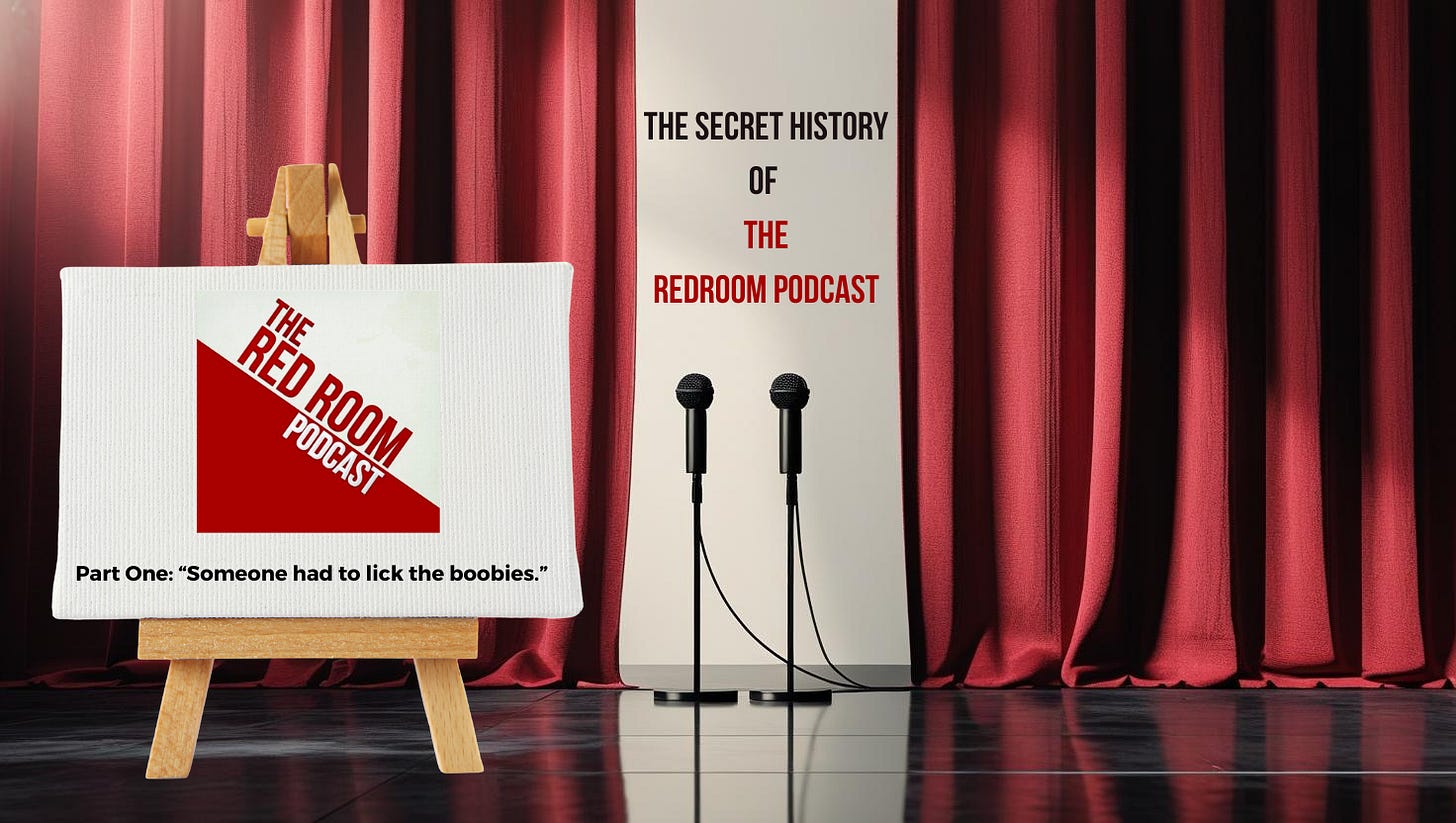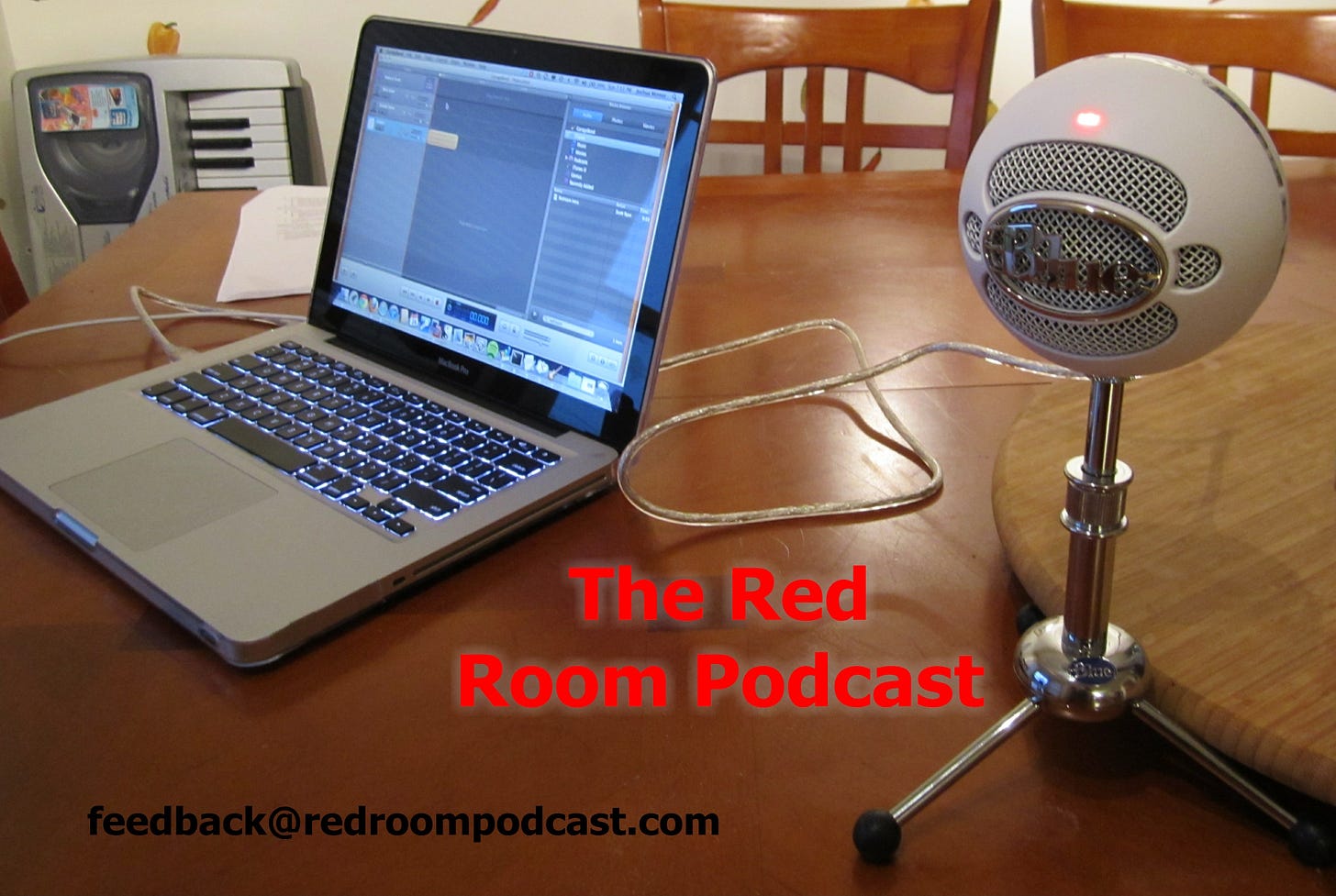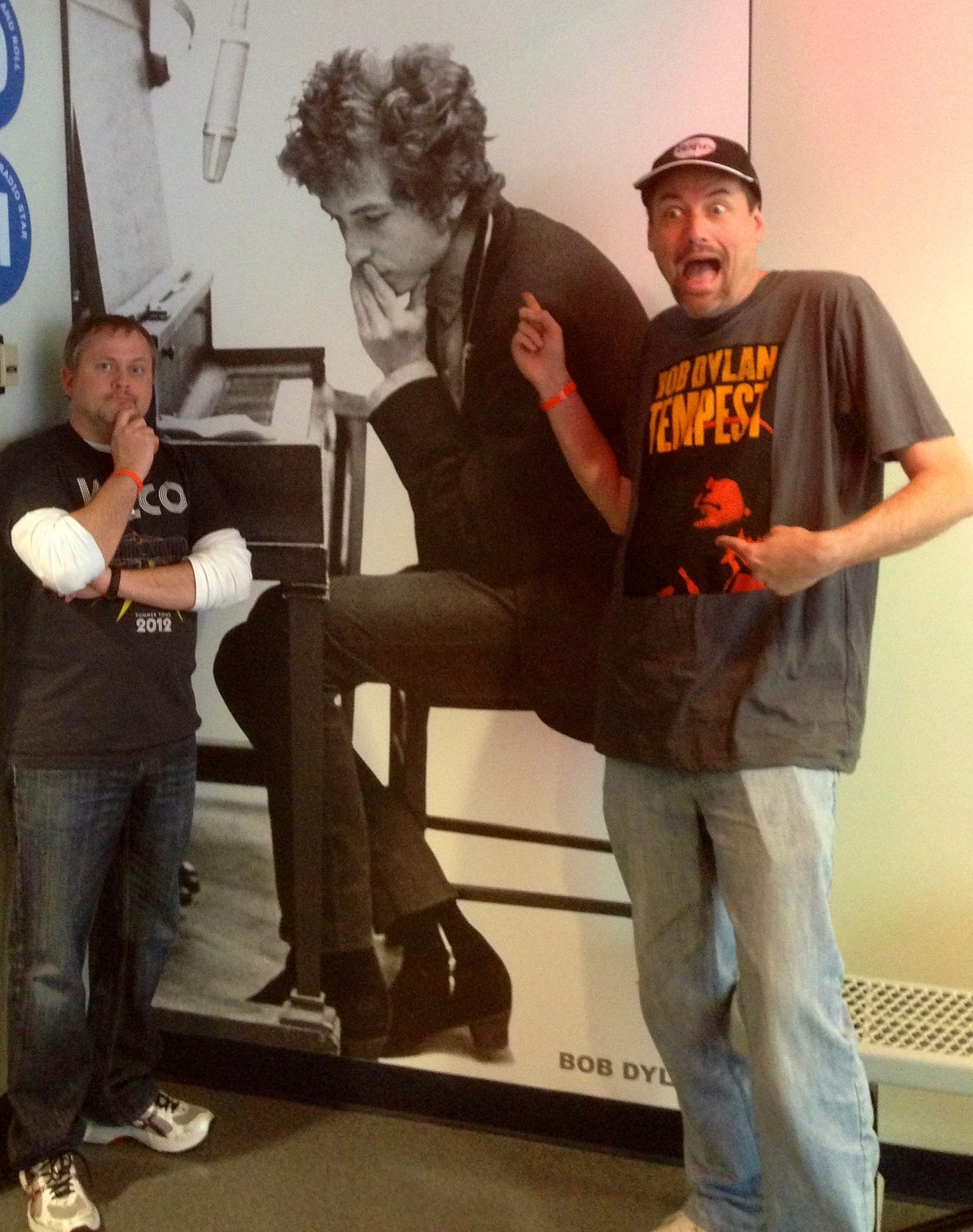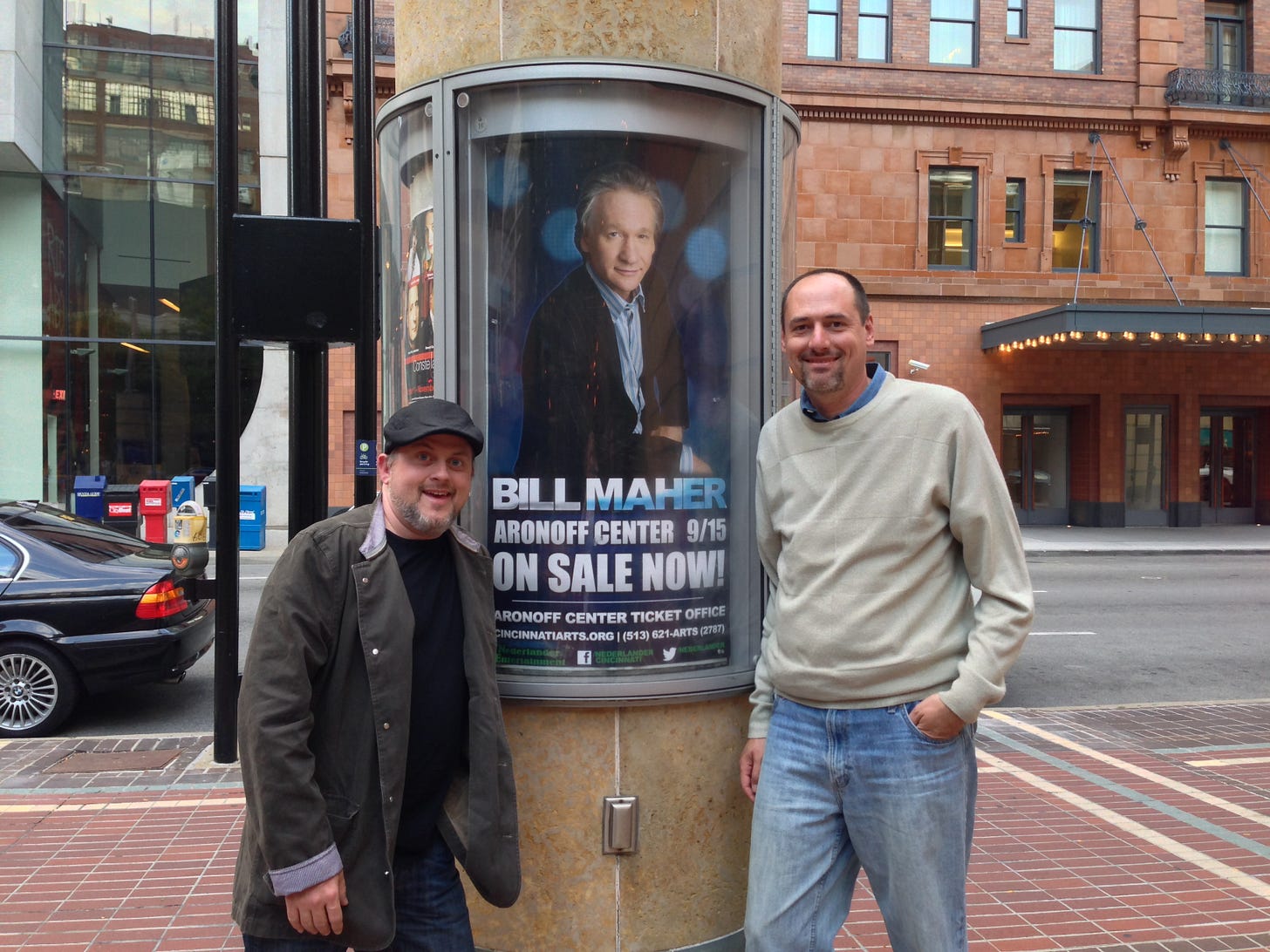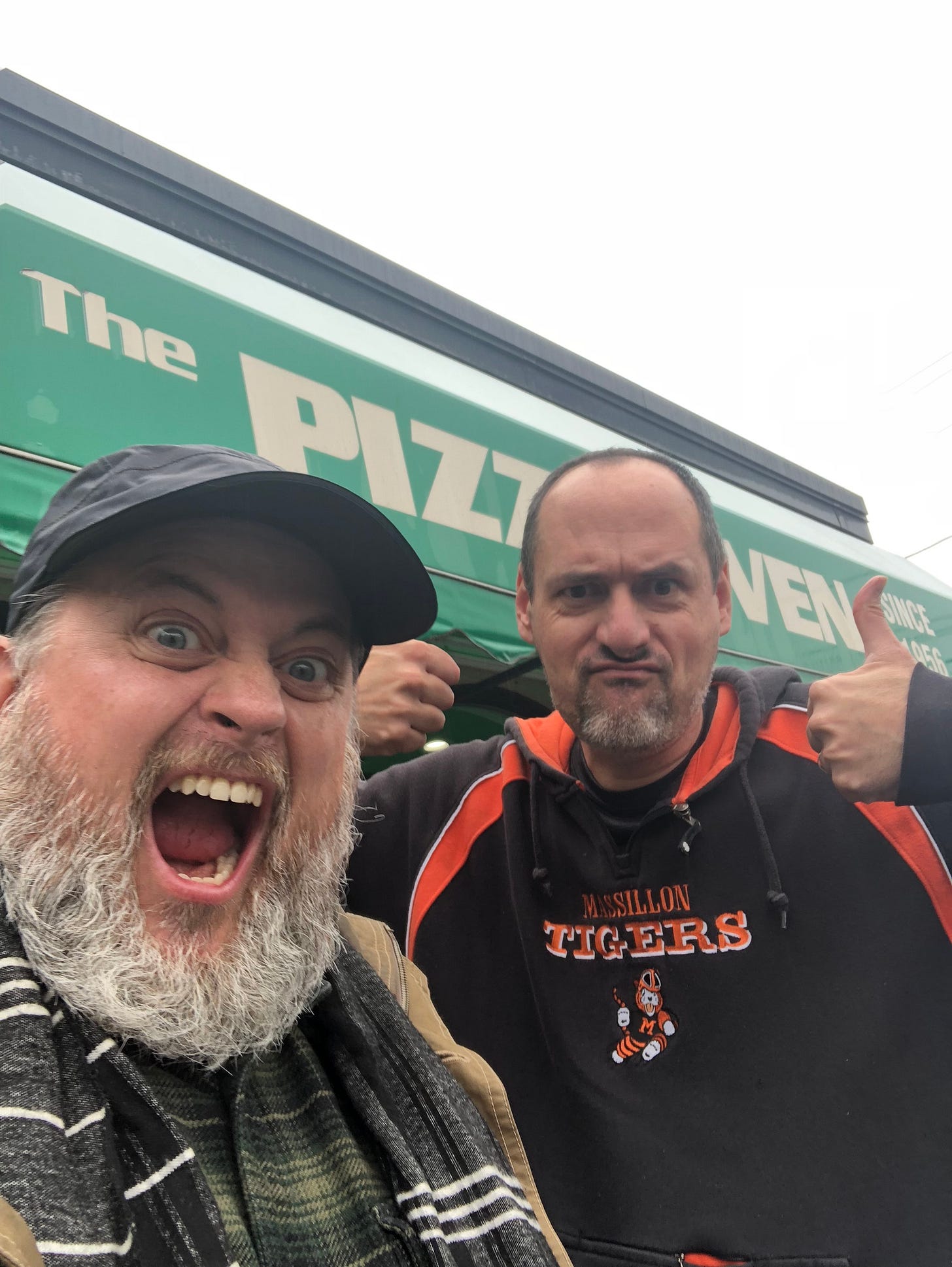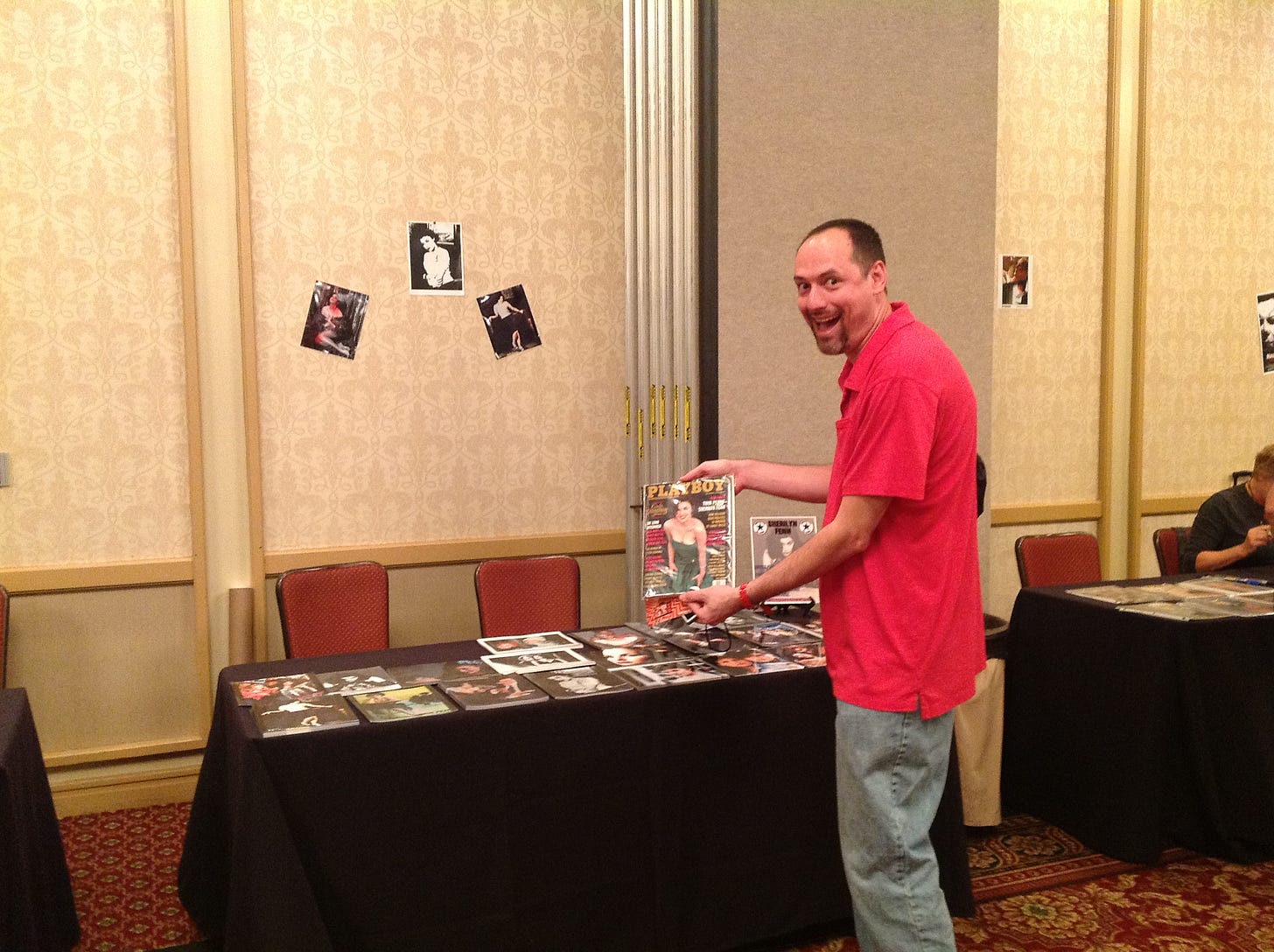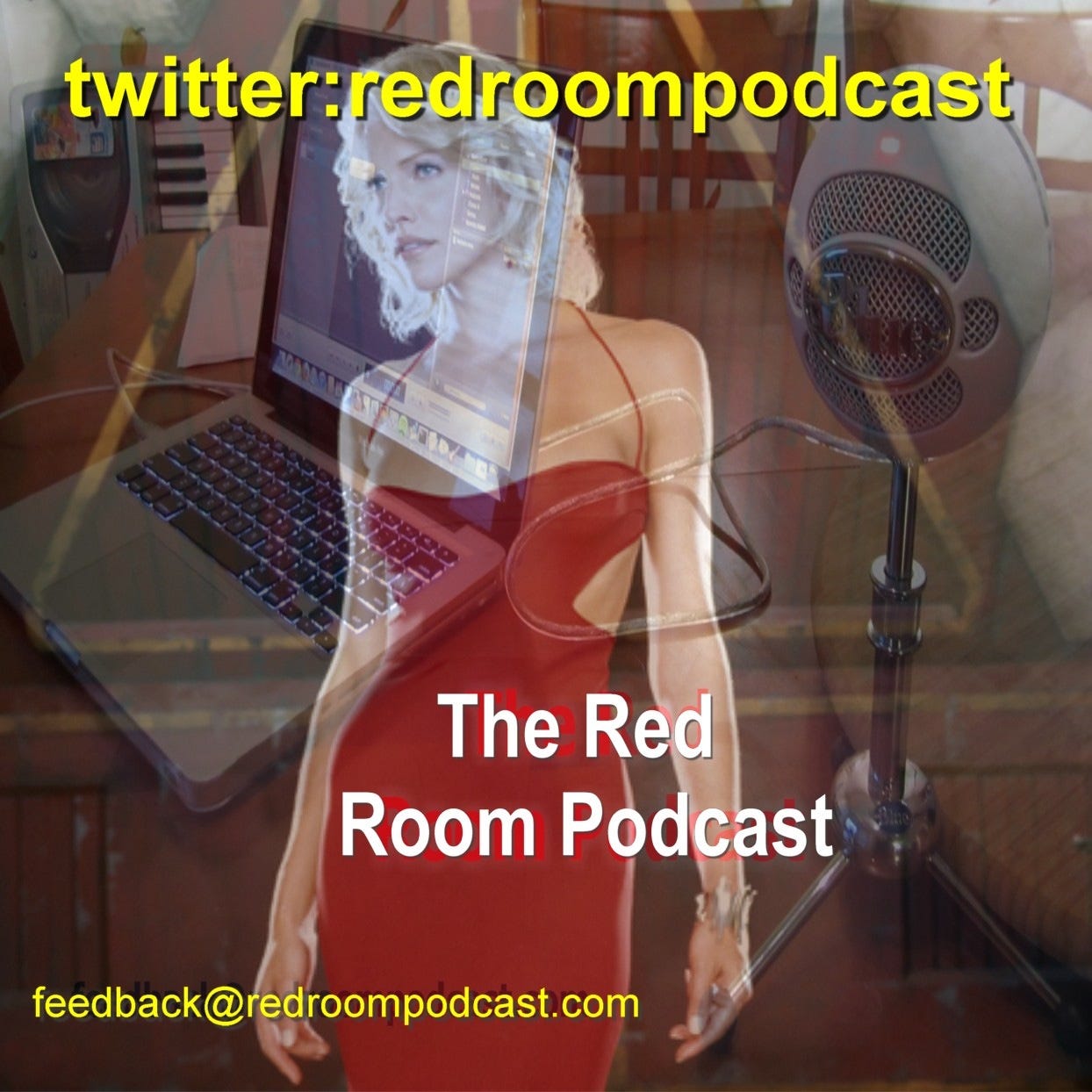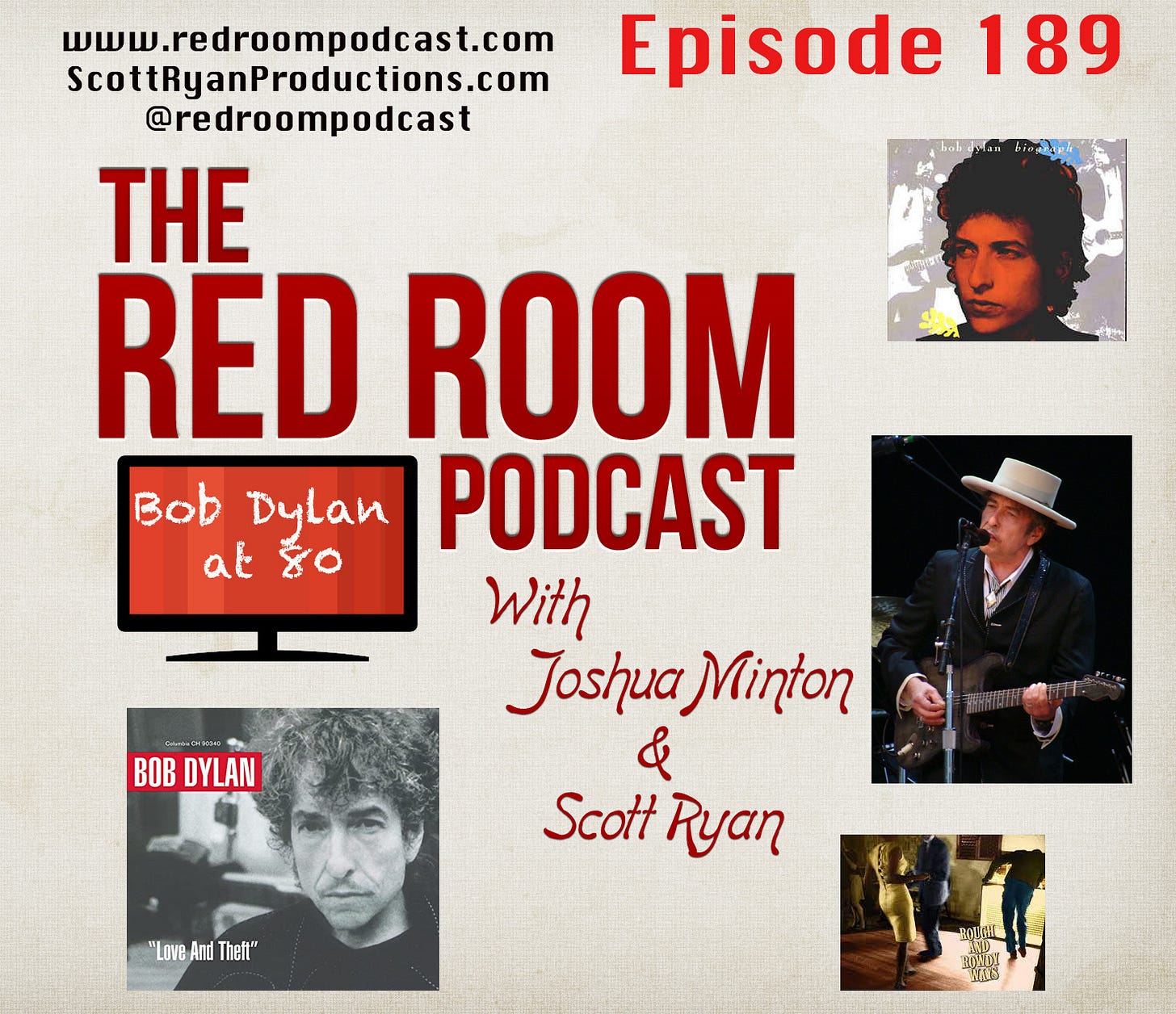PART 1 of 3: The Secret History Of The Red Room Podcast (2011 - 2022)
Part 1: "Beginning" or "Someone Had To Lick The Boobies"
In the latter 20th Century, if you wanted the culture to feel your art, then you had to make a movie, a hit song, or a smash record. When it came to stories, novels weren’t as popular or as easy to engage with, and if a book were good enough, someone would make a movie out of it with a killer soundtrack. The world changed after the release of Jaws and Star Wars in the 1970s. Movies were hyper-life to the most popular film critics of our youth, Gene Siskel and Roger Ebert. You can feel their love and passion for cinema when you rewatch their old shows and hear it in the way they banter and go after each other on camera.
Siskel was a stick in the mud, and Ebert was a fussy know-it-all. Ebert was the better writer because he wrote from his heart, but Siskel wrote from a spreadsheet in his mind, using the ink of synovial brain fluid. His opinions were mainly biting, concise, and justified by cynicism, while Ebert’s assessments were often dreamy and soft.
I always preferred Ebert’s reviews over Siskel’s.
For more than ten years, the Red Room Podcast worked for the people who loved TV enough to listen to two no-named boobs talk about it. This is a story of creativity and taking chances. There are no villains, only artists who got into a vehicle with two steering wheels and eventually started driving off in different directions. It’s a good story, and I’d like to introduce you to a revisiting of the moments that made the Red Room Podcast, and the story of two boobs that begins with a story about boobies.
“Talk Hard” (1989–2004)
It was my daughter’s third birthday party. She had a Barbie cake complete with a little doll as the centerpiece, naked except for frosting. After my child blew out the candles, my wife pulled the doll from the frosting and held it up for the crowd of friends and relatives to see. All of a sudden, my sister in law uncharacteristically yelled out loud to everyone, “SCOTT WILL LICK THE BOOBIES!”
Everyone turned to look at her and the strange, tall, thin man she was standing beside. Scott’s eyes went wide for a second, and, sensing everyone suddenly paying attention to him, something took over, and he performed for the gathered audience. Everyone laughed, including me. I thought, “This guy is funny.” After talking to him during the party, I thought, “He’s also smart.” Scott Ryan thinks on his feet and improvises. He was entertaining, he had substance, and he loved popular television as I did. Scott and I always have something to discuss when it comes to TV. We agree on a few things and disagree on everything else. We both think the other one is an idiot about a few key things that matter to no one else. But in the end, Scott and I could always agree to disagree in good faith. The legacy of the Red Room Podcast serves as evidence of this statement.
Long Live Happy Harry Hard On
Twenty-two years before the Red Room Podcast was created, a movie called Pump Up The Volume started the podcast revolution. In this film, Christian Slater played a troubled teenager who set up an illegal pirate radio station in his suburban home after his parents moved him, against his will, from his last home to a new plastic suburb where teen troubles were paved over and ignored because no one cared about the kids who had never been alright. This was before we had heard of the term Generation X, and not long before we would become the wandering generation, searching for a collective identity that we would never fully discover.
The radio broadcast was illegal in the movie because radio transmissions were controlled by Federal regulations and enforced by the threat of a fine or imprisonment. The film ends with Slater’s character being arrested by the fascist federal agents. As he’s taken into custody in front of a crowd of his peers, he yells two inspirational words to his opaque audience: “TALK HARD!” The final sounds of the movie are new teenage pirate radio stations springing up all over the country. The film concluded that, in the future, everyone will have a voice and an audience, and freedom of expression that will one day be untouchable by regulation and law enforcement. This movie predicted podcasting before any teenager had heard the word “Internet.”
The reality of podcasting, the Internet, and social media would be very different than a global village of wise people sharing the best ideas and moving society progressively forward toward equality of opportunity for all. Like all forms of institutional entertainment, the movies and TV shows we consume serve as vehicles for commercial marketing and identity formation, facilitated by the manipulative forces of cultural hegemony. This stuff has always fascinated me because I understand that I’m being manipulated, but the entertainment has always been worth it for me.
The best stories are the ones we willingly go along with to discover depths beyond our egos. The best art properly inspires transcendence beyond our fragile and fleeting identities. This is what we name Proper Art, and I believe that there are plenty of examples of commercial art worthy of discussing transcendent qualities.
“Talking hard” may very well upend our Democracy by polluting the world with angry noise instead of saving it through intelligent ideas projected through art protected by the freest speech in a radio-free America. But I’m getting ahead of myself.
The year was 2000.
A Short History Of Podcasting
A technologist named Dave Winer found a way to enclose a sound file in a digital feed that would automatically download to a user’s computer when they “subscribed” to updates from that feed. On-demand audio distribution was now a reality. In the world before podcasts, radio programs were broadcast at a fixed time, and if you missed it, you'd better hope your friend had taped it on a boombox with a cassette recorder. Around the same time, other technologists developed web applications that aggregated and managed these feed subscriptions into a standard format, complete with play buttons.
Generation X may not have understood what an RSS feed meant, but we damn sure knew how to click a play button, and we clicked the shit out of buttons for years before the term “Podcasting” was coined in 2004 by some nerd. However, the defining moment for these pirate internet radio shows came when Apple integrated podcast support into iTunes, allowing podcast listeners to index millions of feeds and download these internet shows directly to iPods and eventually iPhones. iTunes provided a user-friendly front end that abstracted away the complexity of podcasting technology, bringing simplicity and consistency to the user experience.
Podcasts were fun, popular, and here to stay.
“What’s Twin Peaks about? I never watched it.”
Scott Ryan performed his Lick The Boobies improv routine live in my home in the Summer of 2009, just before the Lehman Brothers collapsed and nearly plunged the global economy into a depression. No man was better emotionally prepared to live during a depression than Scott Ryan. We have never seen the world the same way. He’s a cynic, and I’m hopeful. I have faith, and he is faithless. I am dedicated to self-improvement, and Scott mines his life for failures to turn into funny stories. We are nothing alike, but he and I could always keep up with each other about television. We found a place to hold a dialogue about important themes and concepts of living as conscientious human beings in a morally decrepit world overfilled with noisy entertainment and a little bit of art.
The bedrock of our partnership was rooted in the following American commercial art:
Star Trek
Seinfeld
Curb Your Enthusiasm
The X-Files
Quentin Tarantino’s movies
Bob Dylan’s music (especially his new Century trilogy)
Fiona Apple
Ronald Moore’s Battlestar Galactica
While my passion and scope of love for these shows and films matched Scott’s, I delivered a massive disappointment to him in our first conversation. Other than Dune, I had never seen a David Lynch movie, nor did I know who Lynch was or what he was about. Worst of all, to Scott, I had never seen Twin Peaks, a phenomenon that completely passed me by in the early 1990s, and Scott seemed baffled. In the introduction to the First Edition of my book A Skeleton Key To Twin Peaks, Scott recalls it this way:
When we met in 2009, we immediately bonded over our love for television. Best Star Trek? The Next Generation. Check. Best version of Larry David? Curb Your Enthusiasm. Check. And you love Twin Peaks? Twin… what? Somewhere a cherry pie hit the floor.
I am not a judgmental person. I accept everyone. But how could someone claim to be an actual television connoisseur and never have seen Twin Peaks? There are some things I can’t accept.
“Introduction” - A Skeleton Key To Twin Peaks by JB Minton, First Edition (2019)
And so, at Scott’s demand request, the four of us (he and I, along with our wives) began meeting at my house every Thursday at 8 PM. We called it “TV Night.” We watched two episodes of the same show or one episode each of two different shows. Over the next two years, we would gather and watch the following television:
Twin Peaks Seasons 1-2, & the movie Fire Walk With Me
Battlestar Galactica (Ronald D. Moore’s) - entire show
The Sopranos Seasons 1 & 2
Boston Legal - entire show
Pushing Up Daisies - entire show
Seperately, we watched The Wire, Downton Abbey, and a few other shows. Eventually, we published Red Room podcast episodes about these shows as we watched them.
Scott has written, directed, produced, and distributed several independent films, in addition to his work on oral histories and a single volume of criticism, which I find the most compelling of his written works. But at heart, Scott is a visual storyteller. In those days, he deployed a nettlesome habit of pressuring friends, coworkers, and acquaintances to star in his productions, which began during the videotape era and continued through the digital revolution, where images and sounds were captured on computer chips. Scott had an ancient computer he called “Old Bessy,” and the video editing software came from an era when he ran a small business making movies as paid projects for weddings, parties, and similar events. One of Scott’s movies will become an important component of the story of our podcast.
In those early days, he managed to rope my wife and me into playing bit parts in one of his latest “Curb” episodes. He wrote and filmed entirely original scripts but stayed true to Larry David’s format of Curb Your Enthusiasm. They were quite amusing for amateur work, and being part of something creative was enjoyable, akin to a form of community theater.
Scott spent a lot of his time engaged in non-commercial creative pursuits outside his work in a corporate call center, which slowly eroded his spirit a little more every day. I think his gonzo art projects were a way to remind him that he was alive and let him remind everyone around him that they were alive too. I used to enjoy this spirit of the artist in Scott. It helped reawaken the artist in me.
Scott preferred his view of the world over anyone else’s, and he has always expected the world to participate in the plays he puts on. And like his reaction to, “Scott will lick the boobies,” he is always ready to act in whatever spotlight he finds himself standing inside. Speaking from experience, if you’re creating a podcast, you want a person like this as your partner.
As for me, I was happy to be talking about television with someone who could keep up with me. Throughout my life, I’ve sought out people who can match my energy during intellectual and moral discussions about popular art, and for a few years, I found someone who could do it.
Act 1: “You Should Create a podcast” || “What’s a podcast?” (2011–2012)
I don’t remember how the first conversation Scott and I had about podcasting started. But I remember he understood me when I told him, “They are internet radio shows that people online subscribe to and listen to on their iPods” (iPhones were just getting started, and I didn’t have one back then).
I quickly learned that Scott was a Luddite when it came to technology. But I also learned that while he knew how to use computers and the Internet, he is a person who accepts change like an old man wiping around a new hemorrhoid. But I also suspected that he would quickly adapt to the podcasting process. I had no idea how obsessed Scott would become with podcasting over the first few years of the Red Room Podcast, but in retrospect, I’d recommend obsession and discipline over talent any day. But when you combine all three qualities into a single artist, stand back and wait to be amazed.
“We should do a podcast about television.” I claim to have created the idea of two random bozos from the Internet talking for 30 minutes about television as art. I suggested to Scott, but neither of us had any clue what that meant or if anyone would ever listen to such a dumb idea. Siskel and Ebert had their show, but they earned it through fifty years of work. Scott and I hadn’t earned the right to talk about anything publicly. We had no credentials, no entertainment industry experience, and no recognized assets of our talents outside of our small independent circle of friends.
But the Internet was for The People, whoever they were. Things were changing with the ability to distribute ideas and art online. We wanted to be part of that movement for change.
For my purposes, I was interested in continuing the scholarly work I concluded during my final year of college, after I received an A in a 300-level elective course, “Television As Popular Culture.” That was the first time I read serious intellectuals writing serious essays about commercial television shows like Star Trek and Thirtysomething. I loved writing and thinking about television. And it turns out, I also loved talking about TV with Scott in front of the Internet.
I conceived the Red Room as a weekly conversation about modern and classic TV, much like Siskel and Ebert hosted their weekly movie discussions. The idea for the Red Room Podcast was simple: two bozos sharing brilliant ideas about modern television to people who thought of TV as something to do instead of thinking. I suggested the name "Red Room Podcast" to Scott because, in those days, anything packaged inside Twin Peaks inspired him to act.
Twin Peaks has always been part of the equation of our partnership, but after we finished watching it, I didn’t understand what his nearly rabid connection was to this twenty-year-old art (at that time). It was also during this time that Scott first mentioned the Twin Peaks Festival, which took place in Washington State. He still had an advertisement from the first festival in his Twin Peaks collection, and it was an event he had been dreaming about attending for years. We’ll revisit this event because it would have a significant impact on our partnership, friendship, and the fate of the Red Room Podcast.
And so, we sat down and recorded several episodes at once. We published six episodes within two weeks, marking the start of our Red Room journey.
Fin Part One
HOMEWORK
Listen to the first-ever Red Room Podcast episode, where Scott and I were searching to understand what this show could be about. You can hear us searching for what this show could be and understanding how our voices would sound together.
This episode was recorded in early August 2011 and broadcast to tens of people on August 20th, 2011.




